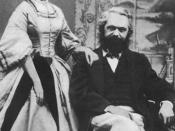This essay will attempt to explain what class is by exploring economic structures. The type of work we do to earn an income doesn't define us alone but the job we do allows us to maintain a lifestyle and pays for what we have. Income and the way we use it affects the way we are perceived by others. Marx and Weber's theories will illustrate how class is defined and whether these theories are still relevant in today's unstable and ever changing society.
Karl Marx stated that classes are defined by work and labour, ownership of property and the means of production. He claimed there were only two classes; bourgeoisie, who own property or capital and exploit labour to increase their wealth and proletariat who work in order to survive and have no other assets. Marx views generally meant that the successful middle class would become bourgeoisie and the unsuccessful would become proletariat.
Marx believes that class is ultimately responsible for shaping our identity.
Max Weber found Marx definition of the classes too simple, arguing that different classes exist but preferring to use status or social prestige as an indicator of which class we belong to. Webers view encompasses a wider spectrum of factors like education, where we live etc he referred to these aspects as lifestyle, within that lifestyle were life chances i.e. opportunities afforded to some and not others depending on their position in the class structure i.e. someone who has benefited from a private education may believe themselves to have better prospects than someone who went to an inner city school. Weber identified four main classes although there were more within these main strata. The upper class, the middle class, the working class and the poor. Weber suggests that status could have as much influence on identity...


